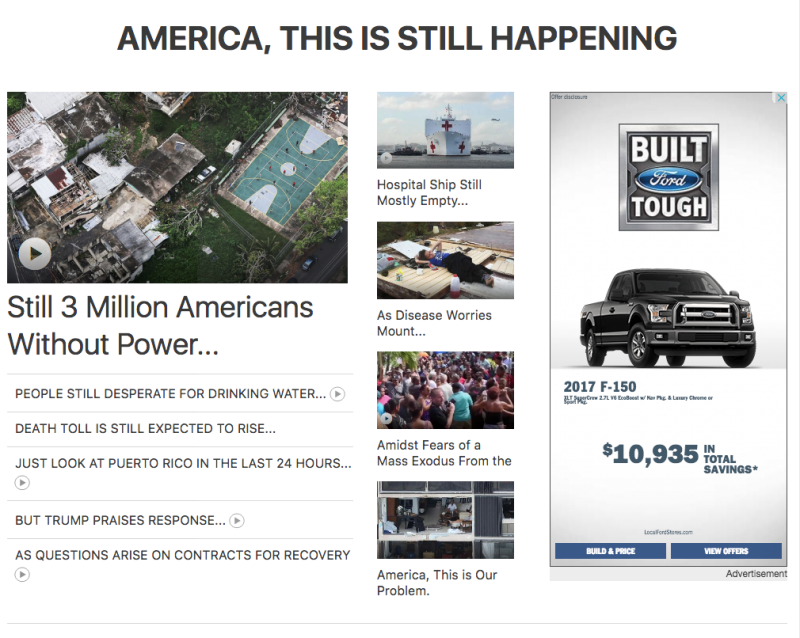What has happened to The Weather Channel? After 35 years of reliably bringing Americans local forecasts, extreme weather coverage, and the heroics of Jim Cantore, TWC and its affiliated website (technically owned by IBM) has captured media attention in recent months for taking the White House and/or mainstream media outlets to task for playing down, inaccurately reporting, or leaving out major climate stories.*
Take The Weather Channel segment last December, when meteorologist Kait Parker devoted nearly two minutes to debunking a Breitbart News climate change-denial article that erroneously used a clip from the channel’s coverage of La Niña. Or weather.com‘s decision to plaster its homepage with articles about climate change on the day President Donald Trump announced the United States was pulling out of the Paris Agreement.
TWC’s latest moment in the spotlight came last Friday, when weather.com devoted its homepage to stories about Hurricane Maria; scrawled across the top of the site was the ominous warning: “AMERICA, THIS IS STILL HAPPENING.” The AV Club’s Dan Neilan put it best: “It’s clear The Weather Channel is not fucking around.”

TWC has focused on around-the-clock coverage of weather and climate science for two years now, ever since it began phasing out its “original non-weather entertainment programming.” But with these latest developments, TWC is proving that doesn’t mean it’s now a boring media outlet you turn to when you want to know what to wear in the morning, or how many inches of ice you’ll need to scrape off your windshield. Rather, it’s a crucial source of climate information and reminders about indisputable physical phenomena in an era when even the most basic facts are under attack.
To learn more about weather.com‘s editorial direction in 2017, we spoke to the website’s editor-in-chief of nearly five years, Neil Katz. The former executive editor of the Huffington Post and CBSNews.com, Katz now leads an editorial team of 60 people at TWC. He spoke to us on the phone about The Weather Channel’s new vision for its homepage, its relationship to politics, and the big stories its reporters are tracking right now.

To start off, tell me a little bit about what inspired the “AMERICA, THIS IS STILL HAPPENING” headline on Friday and the coverage of Hurricane Maria on the homepage.
This story is a slow-moving, ongoing tragedy, and just because the hurricane-force winds and crashing waves have left Puerto Rico doesn’t mean the story has left. A lot of the news media has moved on—that’s the [news] world we live in, it’s a fast cycle. But we wanted to make very clear to everybody that we should still be paying attention. These are Americans, and, 30 days later, they’re still in trouble. We thought it was [important] to dedicate our page to what they’re going through.
Coverage of the headline on Friday reminded me of the site’s decision to plaster climate-change coverage on the homepage on the day Trump announced the U.S. was pulling out of the Paris Agreement. What was the thinking behind that decision?
We discovered that, if we think about our website almost like a magazine, where the cover of a magazine has real power and when you devote an entire issue of a magazine to an issue, people pay attention. It turns out we can do the same thing with the homepage of weather.com. We don’t do it a lot, and we don’t do any political grandstanding as much as people might have thought that’s what was going on that day, but when there are big issues that matter to America and the world and The Weather Channel, we think it’s worth devoting all of our reporting efforts to an issue and explaining that to the public. The things we care about are obviously breaking weather news and keeping people safe during storms, but also climate change, environmental degradation, and aftermath. We think it’s certainly worth giving an entire day’s worth of coverage to issues that matter.
As you said, you are working with climate facts, but some of these are politicized issues. To what extent do you consider how politics affects climate and the weather when you’re planning out your news coverage?
Somewhere between 0 and 0 percent.

(Photo: Twitter)
Why is that?
If you want to argue about politics, there are so many great places to do that, but we don’t need to be another outlet for that. We hope the weather is at least one of the things we can agree should be apolitical. It’s hard to make fake news when you see the wind and rain outside your window. That’s just real. Certainly climate change is an issue that has become politicized, but we are not focused on that part of it, we are focused on the science of climate change, the causes of climate change, and the weather-based impacts that affect millions of people. We think there’s plenty of news to cover in those three buckets without getting into the echo chamber that everyone else is so thoroughly saturated with.
Right, but your decision to devote your homepage to climate change on the day Trump said the U.S. was leaving the Paris Agreement felt politically pointed. Has The Weather Channel’s website had to advocate more for facts since Trump became president?
From our perspective, issues like climate change or an aftermath that an entire island of three million people is facing are so much bigger than who sits in the White House. We just don’t feel that we have to focus on the political rat race of it, which is so well covered everywhere else.
People will read into it what they do. Certainly because we report on the science that says climate change is real and an increasing danger, we took a stance that doing less to work on climate change wasn’t a good idea. But [as for analyzing] the politics of that decision, or who should make that decision in the White House, we don’t feel that’s our place.
Accordingly, I would imagine your readership is quite bipartisan: What are your site’s political demographics like? Do you know off the top of your head?
I don’t; that’s not something we’ve ever polled or focus-grouped. About 250 million people a month use our properties, so that’s a lot of everybody. And when we run these stories, we find people with very strong opinions on both sides of it. And that’s kind of nice, actually. It’s nice to do news that’s not just for the congregation of the converted, regardless of what you’re talking about. It’s not a bad thing to have a little bit of everybody on the site.
So you’re not worried about estranging particular segments of your readership?
I don’t know. I mean, when we do these stories, that’s certainly not our focus, to figure out who’s going to be happy or not with the weather and reporting. We think it’s important news, and want to get it to people.
What has the feedback been like so far for the Hurricane Maria coverage that you did on Friday?
For the most part positive. It’s certainly less controversial than climate change is, and I think just about everyone who comes to the site and sees us focus on the suffering of Americans that needs to addressed, it’s hard to get upset about that. It’s been very positive.
Most people probably think of weather.com as a place to get their local forecast; do you want to reframe how your site is viewed?
We’ve always been a utility and a place for weather news. If you go back to when the channel began 35 years ago on television, in some ways it functioned like an app does today. Every 10 minutes you’d get local weather data. And in between that you’d get explanation, you’d get breaking weather news coverage to keep you safe during the biggest storms, and perhaps surprisingly—to go back to the archives—you would also see stories about the effects of pollution, stories about how weather was affecting agricultural business or how the weather was affecting different parts of the country differently. So we’re certainly famous for being a real-time utility where you can check your weather every day. So that’s great, and we’re happy to have those customers. We also have a three-decade history of doing big breaking news when it matters to our fans.
So in other words, you’re kind of doing what you’ve always done?
We think we’re doing it in a sharper way today, but what we’re doing is I think pretty much in line with the history of the company and the spiritual DNA of The Weather Channel brand.
As you continue to move forward with your coverage, what are the big stories that you and your reporters are tracking right now?
The No. 1 story for us is always keeping people safe from severe weather. So, yes, we’re coming out of hurricane season but we’ll be moving into winter storms and tornado season—so that’s always No. 1 what everyone’s mobilized against. When those are slow, we’re able to focus much more on climate change both on a global basis and how it affects Americans directly. We are about three-quarters through a giant reporting project this year called the United States of Climate Change: We do a story on how climate is affecting every state in the country. It’s been a huge, year-long commitment across the entire reporting team. And of course environmental degradation, we’re definitely interested in environmental legislation, the hot debate about the role of regulation to protect the environment or to make things easier for some businesses, we’re very interested in that topic as well. And we’re deeply interested in the science behind it all. I think that’s what makes us unique: Take any one of these issues, and what is the latest scientific and research and facts that can help us make really good decisions about these topics?
Do you plan on using these magazine-like covers going forward?
We do.
This interview has been edited for length and clarity.
*Update — October 24th, 2017: This story has been updated to reflect IBM’s ownership of weather.com.




